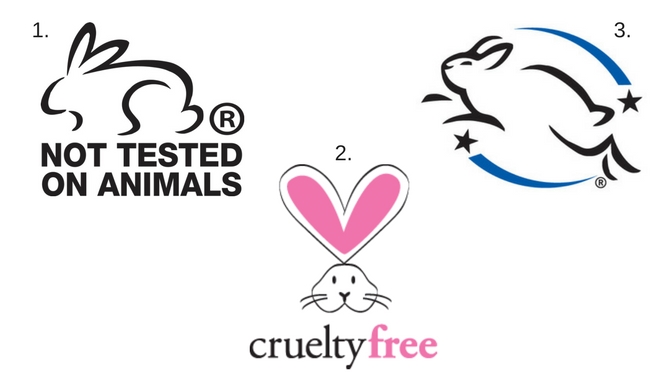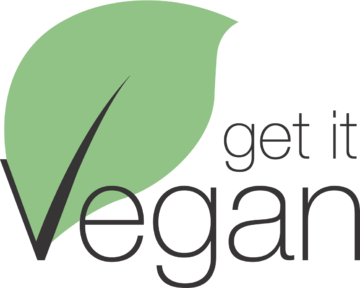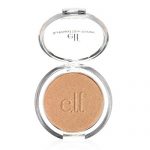Face
From foundation and blush, to eyeshadow and false lashes, you can shop with confidence knowing that all of the makeup products we list on Get it Vegan are 100% free of animal by-products, ingredients and testing.
What does “vegan & cruelty-free" face makeup mean?
The term “vegan”, with regard to makeup for the face, refers to concealer, foundation, blush and other facial makeup that doesn’t contain ingredients that are derived or sourced from animals or insects. The term “cruelty-free” however, refers to makeup for the face that hasn't been tested on animals, from the individual ingredients used, to the final product.
In other words, ‘cruelty-free’ refers to the testing methods, while ‘vegan’ refers to the origin of the ingredients.
Why would face makeup not be "vegan"?
All kinds of animal and insect-derived ingredients find their way into face makeup product formulations. Below is a list of the most common among those ingredients, including some of their aliases, reasons why they're used in contour, foundation, and other facial makeup, as well as common vegan-friendly alternatives to these ingredients.
Carmine: A red pigment that’s used in highlighters, blushes and many other cosmetics (such as lipstick) to achieve certain hues of red, it’s obtained by crushing the female cochineal insect. Reportedly, around 70,000 female beetles must be killed to produce one pound of this red dye.
- Aliases: Cochineal; Cochineal Protein; Cochenille; Carminic Acid.
- Vegan alternatives to carmine: Beet juice, alkanet root, synthetics dyes.
Guanine: Used in highlighter, illuminizer, and other facial cosmetics to achieve a shimmery, luminous effect. It’s taken from fish scales and acids that are located in animal tissue.
- Aliases: Pearl essence; Pearl protein.
- Vegan alternatives to guanine: Leguminous plants, synthetic pearl, fruit pigments, aluminum and bronze particles or mica - a natural shimmery mineral.
Squalene: Typically derived from shark livers, it’s used in many types of facial cosmetics as a moisturizer, and for it’s reported anti-aging effects.
- Aliases: Shark Liver Oil; Squalane.
- Vegan alternatives to squalene: Plant-based oils, most notably olive oil and palm oil.
Lanolin: A product of the oil glands of sheep, extracted from their wool. Used as an emollient in many facial cosmetics (drugstore, designer and others). The cruelty towards sheep in the wool (and as a byproduct, lanolin) industry is often overlooked but well documented. Sheep regarded as inferior are killed; sheep are transported without food or water, in extreme heat and cold, legs are broken, eyes injured, castration without anaesthetics…and it goes on.
- Aliases: Lanolin Acids; Isopropyl Lanolate; Laneth; Lanogene; Wool Fat; Wool Wax.
- Vegan alternatives to lanolin: Plant and vegetable oils.
Amino Acids: Amino acids are the building blocks of protein in animals and plants. Often derived from animal sources such as urine and horsehair. Used as skin conditioning agents in most types of face makeup, including foundations, contours, concealers and others.
- Aliases: Tyrosene, Cystine, Glutamic Acid, Glutamine, Potassium Aspartate, Sodium Aspartate.
- Vegan alternatives to amino acids: synthetics, plant sources.
Beeswax: Beeswax is made from melting honeycomb with boiling water, straining it, and cooling it. It’s used in highlighter and illuminizer as a thickener, and an emollient. It also happens that many bees are killed or have their wings and legs torn off because of haphazard handling when they are farmed.
- Aliases: Apic cerana, Apis Mel, Apis mellifera, Apis Mellifica, Cera Alba, Cera Flava.
- Vegan alternatives to beeswax: Candelilla wax; Soy wax; Sustainable carnauba wax, Cerecin.
Lecithin: A waxy substance in nervous tissue of all living organisms. It can be obtained from nerve tissue, blood, milk and corn, but frequently it’s obtained for commercial purposes from eggs and soybeans. Lecithin can be found in both liquid and powder face makeup, and is used as a skin conditioner and an emulsifying agent.
- Aliases: Choline Bitartrate
- Vegan alternatives to lecithin: Soybean lecithin, Corn-derived lecithin, Synthetics.
Milk: Taken from the milk of forcefully impregnated cows who often endure abhorrent physical abuse, in addition to living in cramped, squalid conditions. Milk is used as a skin conditioning agent in makeup for the face.
- Aliases: Hydrolyzed milk protein; Lactose.
- Vegan alternatives to milk: Plant milks; Soy protein, Other plant proteins.
Is “not tested on animals” the same as “cruelty-free”?
When shopping for facial cosmetics, you’re sure to come across of myriad of statements on labels that are used to subtly mislead you into believing that what you're buying is 100% free of any kind of cruelty towards animals.
Unfortunately, since these terms are unregulated, companies can essentially use them in any way they see fit.
For example, here are some common misleading statements you might find on a product's label, and what they actually mean:
“Against animal testing”
- Just words on a box. This could mean that the company is opposed to animal testing, but does it anyways.
“We don’t test on animals”
- This makeup was not tested on animals, but its individual ingredients were.
“Cruelty-free”
- Could mean anything, without 3rd party verification, they’re expecting you to take it on blind faith. Oftentimes it’s an outright lie.
So, then how can I be sure the makeup I’m buying is cruelty-free?
Despite the rampant deception in the cosmetics world, there are several legitimate third party certification bodies that independently assess whether or not companies and products are actually abiding by recognized cruelty-free standards.
So, the best way to ensure that you’re buying a cruelty-free facial makeup is to find one that has the symbol of one of these third party certification bodies printed on it. 3 of the most common cruelty-free symbols include:

- Choose Cruelty Free Ltd.
- PETA
- The Coalition for Consumer Information on Cosmetics - Leaping Bunny Program
Don’t be fooled! Because these certification bodies all use images of bunnies, so do scammers. Before buying a product, make sure you familiarize yourself with the logos above, so you don’t get tricked into buying something that’s not actually certified as cruelty-free just because there’s a picture of a bunny on it.
What brands make vegan & cruelty-free face makeup?
Facial makeup/cosmetics that are both vegan and cruelty-free are everywhere…you just need to know where to look! Fortunately, The following brands make face makeup that’s completely vegan and cruelty-free:
- ADORN
- Aesthetica
- Au Naturale Cosmetics
- Beauty Without Cruelty
- DeVita
- e.l.f. Cosmetics
- Elate Clean Cosmetics
- Elixery Cosmetics
- Gabriel Cosmetics
- Fairypants
- INIKA
- LUXIE Beauty
Please Note: For the sake of simplicity, this list does not include brands that have ‘vegan options’ for face makeup; it only includes companies whose line facial makeup products are completely vegan and cruelty-free. Also, this list is growing! As we research more companies, we’ll add more to this list!
Is vegan & cruelty-free face makeup expensive?
In general, vegan and cruelty-free foundations, bronzers, primers, concealers and other facial cosmetics are not any more expensive, or any less-expensive, than those that contain animal/insect derived or tested ingredients.
Just like alternative versions, the prices of ‘animal-friendly’ facial makeup can vary based on differences in the quality and the availability of the ingredients used, differences in the manufacturing processes employed, different brand names behind them, as well as a myriad of other factors.
Why should I buy face makeup that’s ‘vegan’ & ‘cruelty-free’?
There’s something to be said about smearing crushed beetles, fish scales, sheep sweat, shark carcass and other nasty ingredients on your face. Aside from that, the farming and sourcing these ingredients is inherently cruel to animals.
If that’s not enough to convince you, it may help to know that, in many, if not all cases, plant-based ingredients are superior to animal and insect-derived ingredients.
Similar product categories
If you’ve found this page on vegan and cruelty-free facial makeup helpful, check out similar product categories to learn or shop more:
For companies that make vegan & cruelty-free facial cosmetics/makeup
If you make vegan and cruelty-free primer, bronzer, foundation, highlighter, or any other vegan/cruelty-free cosmetics for that matter, we’d love to feature you and your products on the “Brands We Love” section of our site! Contact us at - info(at)getitvegan(dot)com - to get started!
Sources
Part of the information for this guide on vegan & cruelty-free facial makeup was gathered from the following sources:
- Living: “Animal-Derived Ingredients List.” (n.d.). PETA. Retrieved July 10, 2017. https://www.peta.org/living/other/animal-ingredients-list/
- Blog: “Are Your Cosmetics Vegan?” Kourtney Linebaugh (October 27, 2012). Gentle World. Retrieved July 10, 2017. http://gentleworld.org/are-your-cosmetics-vegan/
- Skin Care Myths: “13 Animal Products in Cosmetics.” Lorraine Dallmeier (n.d.). Herb & Hedge Row. Retrieved July 10, 2017. http://www.herbhedgerow.co.uk/animal-products-in-cosmetics/
- Resources: “Watch Out For These Cruelty-Free Labelling Loopholes!” Vicky Ly (July 30, 2015). Gentle World. Retrieved July 10, 2017. http://ethicalelephant.com/cruelty-free-loopholes/
- Lifestyle: “Vegan Beauty - Animal-Free Skin Care and Makeup.” Leah Payne (February 1, 2017). Alive.com. Retrieved July 10, 2017. http://www.alive.com/lifestyle/vegan-beauty/
- Find an Ingredient: “Aspartic Acid Beauty.” (n.d.). CosmeticsInfo.org. Retrieved July 10, 2017. http://www.cosmeticsinfo.org/ingredient/aspartic-acid
















